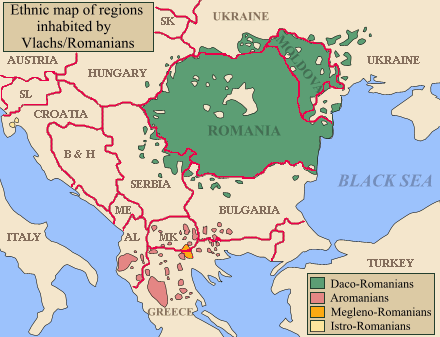| Revision as of 16:07, 30 December 2003 editBogdangiusca (talk | contribs)39,816 editsm +map← Previous edit | Revision as of 17:05, 18 January 2004 edit undoBoraczek (talk | contribs)Extended confirmed users1,408 edits about the origins of the name - changed the description and wikifiedNext edit → | ||
| Line 5: | Line 5: | ||
| They are the descendants of the Roman ] or of the Romanized ]n, ] and ] local population. (see ] for more about the dispute about the origin) Their languages are closely related to each other and it is believed that they were still the same language until the ]. | They are the descendants of the Roman ] or of the Romanized ]n, ] and ] local population. (see ] for more about the dispute about the origin) Their languages are closely related to each other and it is believed that they were still the same language until the ]. | ||
| The name's origin is German |
The name's origin is German. ] initially used this name referring to ] in general. Later on, the meaning got narrower or just different. For example ] in ] is called Włochy. In ], '']'' is the name given to a part of their original territory. | ||
| ''']''' (also known as ''Daco-Romanians'', speaking ]) are living in | ''']''' (also known as ''Daco-Romanians'', speaking ]) are living in | ||
Revision as of 17:05, 18 January 2004
Vlachs (also called Wlachs, Wallachs, Olahs) are the Romanized population in Central and Eastern Europe, including Romanians, Aromanians, Istro-Romanians and Megleno-Romanians, but since the creation of the Romanian state, this term was mostly used for the Vlachs living South of Danube.
 |
| Map of Balkans with regions inhabited by Romanians/Vlachs highlighted |
They are the descendants of the Roman colonists or of the Romanized Dacian, Thracian and Illyrian local population. (see Origin of Romanians for more about the dispute about the origin) Their languages are closely related to each other and it is believed that they were still the same language until the 10th century.
The name's origin is German. Slavic peoples initially used this name referring to Romanic peoples in general. Later on, the meaning got narrower or just different. For example Italy in Polish is called Włochy. In English, Wallachia is the name given to a part of their original territory.
Romanians (also known as Daco-Romanians, speaking Romanian language) are living in
and as a minority in
- Ukraine - 500,000; in Southern Bessarabia and Northern Bukovina
- Serbia - 70,000; in Serbian Banat
- Bulgaria - 20,000
- Hungary - 11,000
- Slovakia - 9,000
Aromanians (speaking Macedoromanian language) are living as a minority in
- Northern Greece - between 700,000 and 1,200,000; mainly in the Pindus Mountains
- Note: the Greek government does not recognise any ethnic divisions, so there are no exact statistics. See Demographics of Greece.
- Serbia - between 100,000 and 600,000; mostly in the Timoc Valley
- Republic of Macedonia - between 150,000 and 180,000
- Albania - between 100,000 and 400,000
- Romania - about 50,000; mostly in Dobruja
- Bulgaria
Megleno-Romanians (speaking Megleno-Romanian language) are living in the Greek province of Meglen, with a population of 12,000.
Istro-Romanians (speaking Istro-Romanian language) are living in Croatia, with a population of less than 1,000.
Religion
Vlach's religion is predominant Eastern Orthodox Christianity, but there are some regions where they are Catholics and Protestants (in Transylvania) and a few are even Muslims (in some regions of Greece and in the European part of Turkey).
See also:
- List of Romanians - Vlachs of Romanian ethnicity
- List of Vlachs - Vlachs of Aromanian ethnicity
- History of Romania - Vlachs from North of Danube
- History of Vlachs - Vlachs from South of Danube